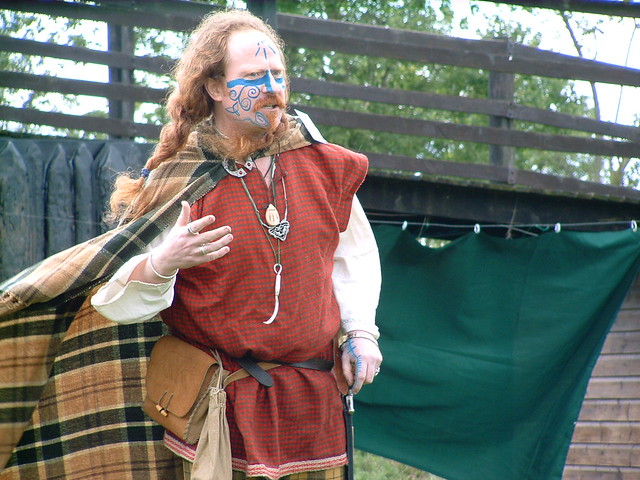This post looks into words for enough, sufficient and related things in the Celtic languages.
| Proto-Celtic | *ɸroweros = many, enough, sufficient *laweros = many, enough, sufficient |
|---|---|
| Old Irish (Goídelc) | lór = enough, sufficient, sufficiency |
| Middle Irish (Gaoidhealg) | lór, loor, lour, leór, lour = enough, sufficient, great, ample, adequate, competent; sufficiently |
| Irish (Gaeilge) | leor [l̠ʲoːɾˠ/l̠ʲɔːɾˠ] = sufficient, ample, go leor = enough, plenty leorchúiteamh = indemnification leordhóthain = sufficiency, plenty leorgnhíomh = full amends, reparation, restitution |
| Scottish Gaelic (Gàidhlig) | leòr [̪lʲɔːr] = satiety, sufficency gu leòr [gə l̪ʲɔːr] = enough, sufficient(ly), galore leòr-ghnìomh = satisfaction leòrachd = amplitude |
| Manx (Gaelg) | liooar = sufficient dy liooar = adequate, ample, enough, galore, sufficient, umpteen |
| Proto-Brythonic | *llower = |
| Middle Welsh (Kymraec) | llauer, llawer = many, lot, much, abundance, large quantity, frequent, numerous llauered, llawered, llavered = many, large number(s), lot(s), much, abundance |
| Welsh (Cymraeg) | llawer [ˈɬau̯.ɛr] = many, lot, much, abundance, large quantity, frequent, numerous llaweredd = many, large number(s), lot(s), much, abundance llawerhau = to multiply |
| Middle Cornish (Cernewec) | lower, = many, much |
| Cornish (Kernewek) | lower = many, much lower gweyth = often |
Etymology: the reconstruction of the Proto-Celtic root is disputed – both possibilities are given. *laweros is possibly from *leh₂w- (to seize, to gain, benefit, prize) [source], which is also the root of the English word lucre (money, riches, wealth), the Swedish word lön (reward, salary, wage), the Irish word luach (value, price, reward), and the Welsh word golud (wealth, riches) [source].
The English word galore comes from Irish go leor and/or Scottish Gaelic gu leòr [source].
| Proto-Celtic | *sātis = sufficiency, fill *sāss-ā- = to satisfy |
|---|---|
| Old Irish (Goídelc) | sáth [saːθ] = satiety sáith = fill (of food), sufficiency sáthech = sated, satiated, satisfied sáithigid = to satiate, satisfy |
| Middle Irish (Gaoidhealg) | sáith, sáth, sāth = sufficiency, as much as one requires, fill (of food), customary meal, appetite sáthech, sathach, sāithech = satisfied, filled, content, flourishing sáithigid, saithigudh = to satiate, satisfy |
| Irish (Gaeilge) | sáith [sˠɑː(h)/sˠaːç] = (full) meal, feed, fill, sufficiency, enough sáithigh = to sate, satiate, saturate sáithitheach = saturating sáithiú = satiety, saturation |
| Scottish Gaelic (Gàidhlig) | sàth [saː] = plenty, abundance, fill sàthach [saː.əx] = filling, satiating; satiated person, bellyful, plenty, enough sàthachadh [saː.əxəɣ] = (act of) sating sàthachd [saː.əxg] = satuaration |
| Manx (Gaelg) | saie = satiety, fill, satisfaction, replete, satiated saiaghey = to satisfy, saturate saieagh = satiating, satisfied saieid = satiation, repletion, glut saieys = satiety, repletion, sufficiency |
Etymology: from Proto-Indo-European *seh₂- (to satiate, satisfy) [source], which is also the root of sad, satisfy and satiety in English; satt (not hungry, satiated, full, done) in German; zat (fed up, drink, sated, full) in Dutch; sazio (sated, full up) in Italian, and sāts (moderation, satiety, fill) in Latvian [source].
| Old Irish (Goídelc) | doíthin = sufficency |
|---|---|
| Middle Irish (Gaoidhealg) | doíthin, doéthain, deothin = a sufficiency, enough doíthenach = satiated, satisfied |
| Irish (Gaeilge) | dóthain [ˈd̪ˠoːhənʲ/ˈd̪ˠɔhənʲ] = enough, sufficiency dóthanach = satiated, fed up, tired dóthanacht = satiety |
| Scottish Gaelic (Gàidhlig) | daothain [dɯː.ɪn̪ʲ] = sufficency, fill |
Etymology: unknown [source].
| Proto-Celtic | *dīkāneti = (?) |
|---|---|
| Old Welsh (Kembraec) | dicone = to do, make, act, perform |
| Middle Welsh (Kymraec) | digaun, digawn, digaunt = enough, sufficiency, plenty diconher, digoni = to do, make, act, perform |
| Welsh (Cymraeg) | digon [ˈdɪɡɔn] = enough, sufficiency, plenty, abundance, adequate, plentiful, ample digoni = to do, make, act, perform, to satisfy, suffice, fill, satiate, digonol = adequate |
Etymology: possibly from Proto-Celtic *dī- (from, of) and *kān- (sound) [source].
Breton words for enough, sufficient, etc include:
- trawalc’h = enough (of), enough!
- bast = sufficient
- brasoni = sufficiency
- sufis = sufficient, adequate
Etymology: unknown.
Sources: Wiktionary, Etymological Dictionary Of Proto Celtic, In Dúil Bélrai English – Old Irish glossary, eDIL – Electronic Dictionary of the Irish Language, Teanglann.ie, Am Faclair Beag, An etymological dictionary of the Gaelic language, Fockleyreen: Manx – English Dictionary, Online Manx Dictionary, Gaelg Corpus, Geiriadur Prifysgol Cymru, Lexicon cornu-britannicum : a dictionary of the ancient Celtic language of Cornwall, Gerlyver Kernewek, Devri : Le dictionaire diachronique du breton, Dictionnaires bilingues de Francis Favereau / Edition Skol Vreizh, TermOfis








